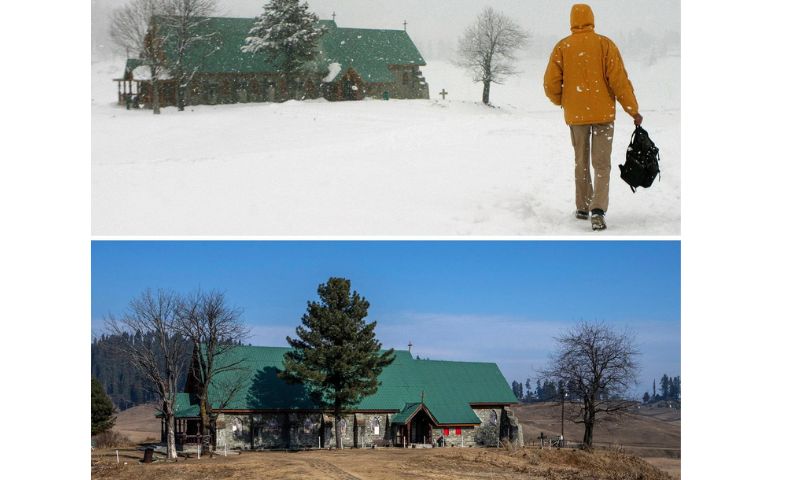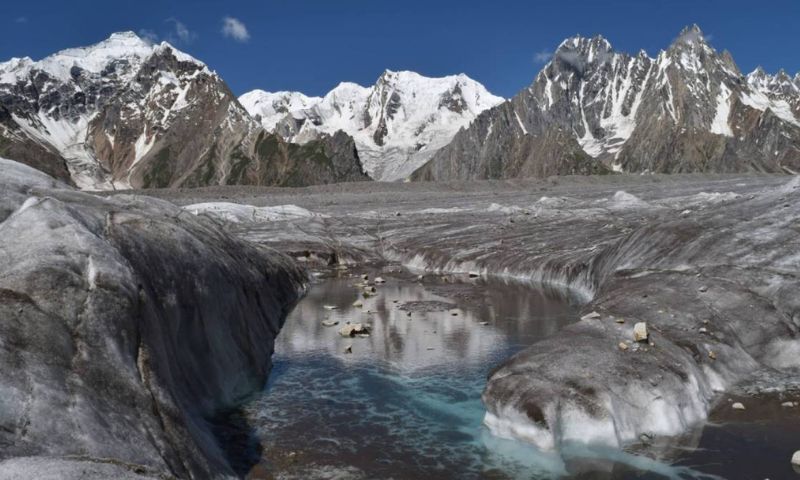Imminent challenges linked with unpredicted climate changes are turning more severe with every passing day. Alarming reduction in rainfalls is unprecedented in mountain ranges and consequent devastating impacts on agricultural, economic and tourism related activities merit focused measures. Factor of water shortage alone is capable to disturb the normal socio-economic cycle. Extra-ordinary decline in snowfall is a stark reminder of larger than expectation water related crisis across Asian region. Snowless winters in Karakoram and Himalayan Mountain ranges cannot be ignored as a temporary weather flick. Weather pattern emerging in past three years on this account is very consistent and equally disturbing.
Unexpected rise in average temperature recorded between six to eight degrees Celsius in Himalayan and Karakoram Mountain ranges indicates the beginning of very turbulent weather instabilities. As per climate experts, such abnormal increase of temperature in comparatively cold regions is undeniable evidence of global warming. Snowless winter season in IIOJK and Northern areas of Pakistan has started damaging the local economies which rely mostly on tourists’ influx. Estimated contribution of tourism economy to the overall GDP of the region is seven percent. Majority of locals, dependent mainly on tourists’ arrival during snowfall seasons, are facing an unmanageable economic crisis. Unlike the past precedence, snowfall season did not begin in October-November this year.
Unfortunately, it has not yet started! Interrelated local businesses like hotels, guestrooms, transportation etc have not seen the traditional boom in current snowfall season because the tourism related activities are practically frozen. This tough economic jolt to local residents is just the beginning of much severe unfolding of turbulent climate changes. Global warming is a clear and present danger to the existing ecological order. Reduction in rainfalls, snowless winters and faster melting of glaciers are those lasting consequences which cannot be mitigated without requisite preparedness. This deep rupture in ecological system would remain irreparable even at regional level until an effective global consensus transforms in practical remedial measures.
Pakistan is among the top ten most affected countries with climatic changes. Ironically, Pakistan produces just 1% of those gases which damage the ecological system. On the other hand, estimated share of Western countries in production of harmful gases is 68%. This simply means that Pakistan is facing the consequences of climate follies committed by the other nations. Overwhelming global climate misconduct has led to dangerous decline in rainfalls. During past three years, Pakistan has faced 80 to 92% shortfall in rains. Besides damaging the agricultural activities, such a colossal reduction in rainfall means alarming decline in water reserves. Unreplenished glacial reserves due to reduced rainfall straightway result in lowering of water table which cannot be taken as a small to routine agrarian and socio-economic activities in rural as well as urban areas.
Rapid melting of glaciers due to rising temperature is bound to trigger enhanced flow of water down the stream. This intense water flow before the usual sowing season will have multiple damaging effects on agrarian system. Massive urban flooding in downstream areas is the first and foremost threat. Catastrophic 2022 floods across Pakistan are the most relevant example to gauge the wide scale impact of climate related consequences. Losses caused by these floods were estimated over $ 30 Billion. Erratic weather shifts hindering the agrarian routine are going to create larger food security crisis in the days to come. Latest snowless winter season is a very alarming weather change dangerously conforming to rapid melting of glaciers. These glaciers are the prime source for Indus basin system rivers. Most of agrarian activities in Pakistan are dependent on water flow form Himalayan glaciers. These glaciers are natural water reserves for the entire dependent region. Snowless winter after rapid meltdown of glaciers in extended summer season is obviously a big blow to water reserves. Unreplenished snow glaciers are early warning signs of looming water scarcity crisis. This multifaceted crisis has vast potential of damaging the local economy, food security, infrastructures, hydro based electricity generation projects and domestic life.
A climate vulnerable country like Pakistan cannot afford lackluster approach towards unprecedented weather changes. Wide losses to human life, infrastructures, live stocks and standing crops during past floods multiplied economic burden on Pakistan. Recurrence of flash floods in near future may squeeze the already deteriorated socio-economic structure of Pakistan. Due emphasis on long term remedial measures is still missing at national level. Major political parties aspiring to formulate the next government after elections have not yet moved beyond verbal commitments on the matters related to climate change.
Food insecurity, infrastructural damages, water scarcity and interrupted power generation amid unpredicted flash floods would be devastating for already crippled economy of Pakistan. Irregular rainfall pattern, reduced snowfall season and faster melting of glaciers indicate the gathering of a huge storm. Comprehensive climate strategy should get due space in manifestoes of all political parties. This exercise can be made more objective with exclusive input of climate experts. Severity of looming climate challenge merits concrete measures beyond verbal claims and inadequate broad brush hollow actions.
























